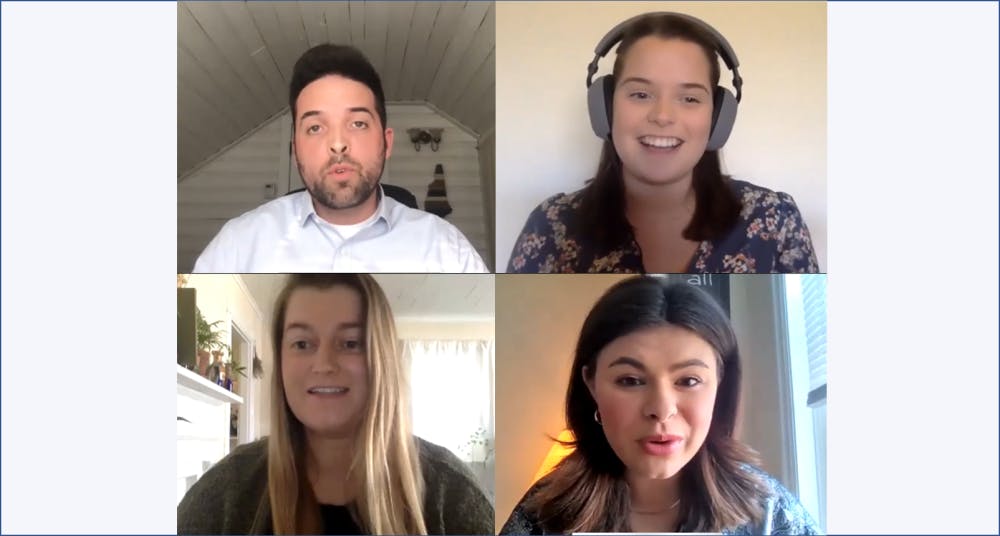In an effort to help aspiring young journalists adapt to reform in the industry, the University of New Hampshire (UNH) journalism program organized the annual Donald M. Murray Visiting Journalist event; this year being titled “Journalism Today and Tomorrow: Lessons Learned in the Newsroom.”
UNH journalism alumni and established journalists Hadley Barndollar (’16), Olivia Darocha (’19), Chiara Vercellone (’19) and Kyle Stucker (’09) were the panelists and were joined by host and UNH journalism chair Tom Haines. Stucker, Barndollar and Vercellone all work under the USA Today umbrella of organizations, while Darocha has cemented herself as a digital reporter at ABC 6 in Rhode Island.
Despite the focus being centered on present and future reform in the journalism industry, the conversation’s emphasis was put on “today,” as the guilty verdicts of Derek Chauvin, George Floyd’s killer, were announced Tuesday night. These verdicts of second-degree unintentional murder, third degree murder and second-degree manslaughter were announced just as the event began.
“The time that they were supposed to announce the verdict, was the same time that the entire panel hopped on a pre-panel call and we were all trying to figure out what was happening at the courthouse while staying in touch with our colleagues,” Gannett New England Justice Reporter Stucker explained. “It was very fitting to have a panel start at the same time the verdict came in.”
Haines quickly redirected the dialogue once the trial reached a resolution and used the moment as a case study for how journalists react to and relay breaking news of a high magnitude.
Stucker and Barndollar continued about their joint work for the same news organization, Gannett, and have been working on social equity projects to pinpoint how communities have adjusted since the Black Lives Matter and other social movements ensued in 2020.
“The world that we have been covering the pain and suffering that stemmed from George Floyd's murder last May, and to hear this verdict today is very emotional not only like as a human being, but the fact that we have invested our life's work into this over the last 365 plus days,” Barndollar said.
When Floyd was killed in May of 2020, Darocha was working as a digital reporter in Colorado Springs, and even though she was not close to the incident, she quickly realized that it would be affecting her life and job as a journalist.
“I think for all of us as journalists we established that even if a story happens in another state, it's going to still impact you in some sort of way. That was kind of my first understanding of this when we had protests in Colorado Springs for days on end, and I was out on the streets with the protesters but also with police,” Darocha said.
Vercellone, a new USA Today fact checking hire, has been at her post for just under a month. Her experience covering the trial was limited, but it still had an effect on her during Wednesday’s discussion.
“While we have focused a lot on the trial in the last couple of weeks, I only joined USA Today at the beginning of the month. But with news breaking of this magnitude, for me, it was actually really hard to focus at the very beginning of the event. I'm glad that it came early, quote unquote, early, just because I think it would have been really hard for all of us, I mean, even the audience,” Vercellone explained.
At about the midway point, the panel transitioned to a lighter discussion on how student journalists can excel in an everchanging world of journalism.
The consensus from the panel was that a relentless, perseverant nature will push aspiring journalists over the edge in the industry.
Darocha included that she had to intern at three different news stations before she landed her first digital reporting job in Colorado, and Vercellone applied to over 100 journalism jobs after her getting her graduate degree from Medill School of Journalism at Northwestern University before securing her fact checking position.
“Getting your foot in the door is key,” Stucker said. “All of you have been honing those skills and demonstrating those as students, you already have a lot of those. Look for something where you can really kind of put your heart and energy into, and really find a way to, to cover the hell out of.”
Vercellone emphasized that young journalists shouldn’t be afraid to make mistakes, and take initiative in ideas and concepts that they don’t fully grasp yet, as it’s crucial to their development.
“This is the time that you have to fail, as a student,” Vercellone said. “During your first job during your second job I mean you're constantly growing in this industry and learning.”
After the conclusion of the event, Stucker told The New Hampshire that the experience to reach UNH students virtually was huge for him. After his graduation in 2009, he has tried to contribute to his beloved alma mater in any way possible.
“I really like doing it, and I think it’s really important, especially for students who are trying to enter this field and for ones that are already working in this field,” Stucker said. “UNH and that program was a big part of my life, so if there’s any way I can give back then I definitely will.”
Photo courtesy of the University of New Hampshire: Kyle Stucker ‘09, justice reporter for USA Today network; Chiara Vercellone ‘19, social media fact-checker at USA Today; Hadley Barndollar '16, N.E. reporter for USA Today network; Olivia DaRocha ‘19, broadcast journalist with Providence ABC 6.












